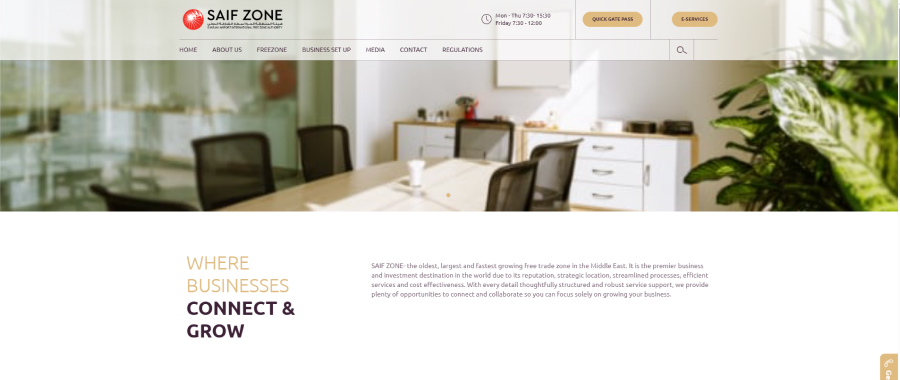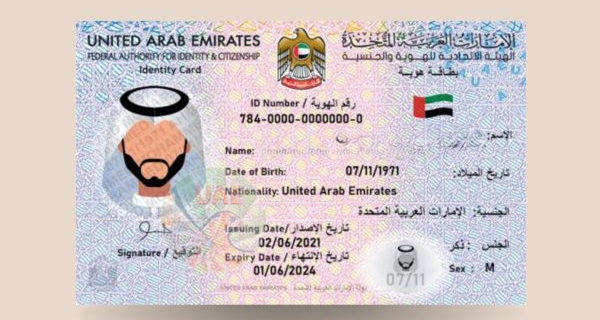Looking for the most cost-effective free zone to register your UAE company? Sharjah Airport International Free Zone (SAIF Zone) might be your best choice.
Why? Because it blends two things that don’t always show up together: affordability and global access. This free zone, which is right next to Sharjah International Airport, has become a starting point for business owners who want to do business around the world without spending all of their preliminary funds.
For over two decades, SAIF Zone has attracted freelancers, SMEs, and multinational firms alike. Some come for the quick licensing process — often done in just a few days. Others like the fact that you can register remotely, which means no wasted flights or hotel bills. Many stay because of the flexibility: whether you’re trading goods, offering consultancy services, or running a light industrial operation, there’s room here to grow.
In this guide, we’ll walk through why SAIF Zone is worth considering, how to set up step by step, what licenses and visa packages cost, and who this free zone is (and isn’t) the right fit for.
Why Choose Sharjah Airport International Free Zone (SAIF Zone) for Business Setup?

If you’ve been comparing free zones in the UAE, you’ve probably noticed one thing: some of them sound great on paper but end up draining your budget with hidden costs. That’s where SAIF Zone feels different. Tucked right next to Sharjah International Airport, it’s not just a spot on the map — it’s a practical base for businesses that want global reach without burning through their startup capital.
Entrepreneurs like it because the process is quick, the paperwork is lighter than in many other zones, and — here’s the part that wins over freelancers and overseas investors — you can register remotely. No flights, no hotel bills, no wasted time waiting for appointments. Add to that flexible license types and packages that don’t force you into renting massive offices you don’t need, and you start to see why SAIF Zone has a reputation for being cost-effective and friendly to small businesses.
About Sharjah Airport International Free Zone (SAIF Zone)
SAIF Zone isn’t a newcomer. It’s been around since 1995, and the Sharjah government has backed it from the start. That backing matters — it means regulations are clear, processes are streamlined, and you’re not setting up in some experiment that might vanish tomorrow.
Over nearly three decades, the free zone has built a solid reputation and now hosts thousands of companies from over 160 countries. What makes it stand out is the location: you’re sitting right by Sharjah International Airport and only a short drive from seaports like Port Khalid. For trading companies and logistics providers, that’s gold. Goods fly in, get processed, and move out — without unnecessary detours.
Business Activities Allowed in SAIF Zone
One of the underrated strengths of SAIF Zone is how wide its activity list runs. You can trade, consult, handle IT services, run marketing agencies, manage logistics, or even do light industrial work like packaging and assembly.
Because it’s near the airport, some activities tied to aviation need special approval, but otherwise, the doors are wide open. Warehousing and distribution are especially popular here — and it makes sense. If you’re running a business that depends on the quick movement of goods, having your office and storage space in the SAIF Zone saves both time and money.
Sharjah Airport International Free Zone Corporate Tax, VAT, and Duties
Taxes in the SAIF Zone are straightforward. Since mid-2023, the UAE has applied a 9% corporate tax on business profits over AED 375,000. Free zone companies, however, can still claim the 0% rate on qualifying income as long as they keep a real presence in the zone and don’t run business that falls outside the approved scope with the mainland.
There is no personal income tax in the UAE, so salaries, dividends, or other personal earnings stay untaxed.
Customs are another plus. Bringing goods or raw materials into the SAIF Zone is duty-free if they’re re-exported or used for licensed activities. The only time duty is charged is when goods are moved into the mainland UAE for local sale.
This mix of 0% qualifying tax, clear VAT rules, and duty-free trade is exactly why the SAIF Zone is often chosen by companies that want to keep costs down while staying compliant.
Step-by-Step Sharjah Airport International Free Zone (SAIF Zone) Company Formation and Registration
SAIF Zone is built for speed. The process isn’t complicated, but it does reward tidy paperwork. Here’s the flow.
Start by choosing the legal form.SAIF offers three structures:
- FZE (Free Zone Establishment) — single shareholder (individual or company), limited liability.
- FZC (Free Zone Company) — two or more shareholders, limited liability.
- Branch — an extension of an existing UAE or foreign company; no separate legal personality.Pick this first—it decides the documents you’ll submit and how the licence is issued.
File the application and reserve the name.Your agent (or you) submits the SAIF application with proposed activities, trade name, and shareholder/director details.
Attach the core documents.Expect passport copies, proof of address, and photos for individuals. For corporate shareholders/branches: certificate of incorporation/registration, MOA & AOA, board resolution, and authorised signatory details; branches add parent-company documents. SAIF’s own checklist mirrors this.
Authority review and facility selection.While SAIF reviews, line up your space (flexi-desk, office, warehouse). The facility you lease will later influence your visa quota.
Incorporation and licence issuance.Once approved, SAIF issues your corporate docs and licence. For branches, it’s an operating licence tied to the parent.
Immigration setup and visas.After licensing, open the immigration file (establishment card) and process visas step-by-step (entry permit, medicals, Emirates ID). Quotas scale with the size/type of space.

Typical timing.Clean files often get licensed within a few working days; specialized activities can take longer.
Required Documents and Timeline
To open a company in the SAIF Zone, the authority expects both personal and company documents. On the personal side, shareholders and directors provide the basics: a passport copy, proof of address such as a utility bill or tenancy contract, a few photographs, and, if they are already in the UAE, a copy of their entry permit or visa.
The corporate paperwork is heavier. Every applicant must submit the zone’s official application form along with the Memorandum of Association and the Articles of Association. A Share Register is also required to make clear who owns the company and in what proportion. If the shareholder is itself a company, then incorporation papers have to be legalized and attached, including a board resolution authorizing the new entity. In some cases, the authority may ask for a Certificate of Good Standing to confirm that the parent firm is still active.
For certain activities — light industry, aviation, or anything that touches on security — extra approvals or even a business plan may be requested. The timing is one of SAIF Zone’s strong points: straightforward trading or service companies are usually licensed within three to five working days, while industrial activities can take a little longer. If residence visas are part of the application, additional time is needed for the entry permit, medical checks, and Emirates ID.

Want to learn more about UAE business setup services?
Remote Registration Option
Now, the part freelancers and international investors love: you don’t even have to get on a plane. SAIF Zone allows remote company formation.
Usually, it works like this: you appoint an authorized agent in the UAE, send them your documents, and go through an identity verification step — often as quick as a short video call. After that, the license arrives. Digital copies land in your inbox, and physical originals can be couriered to your doorstep.
For anyone balancing budgets, schedules, or family responsibilities, this remote path is a lifeline. You get your UAE company without leaving your home office. Fast, simple, and — best of all — no jet lag involved.
Types of Licenses and Costs in Sharjah Airport International Free Zone (SAIF Zone)
Let’s be real — when people ask about setting up in SAIF Zone, the first follow-up question is always: “Okay, but how much does it cost me every year?” The answer depends on what you want your company to actually do.
Licenses fall into three buckets:
- If you’re trading, importing, or exporting, you’ll need a Commercial/Trading License.
- If you’re running a consultancy, design studio, IT service, or something similar, a Service License is the fit.
- If you’re assembling, packaging, or light manufacturing, that’s an Industrial License.
Nothing too complicated there. The real decision point comes when you look at the visa side of things.
Visa Packages and Pricing Breakdown
In the SAIF Zone, visa quotas are linked directly to the office or facility you lease, and the authority publishes clear package options with fixed pricing.
A SAIF Office is the entry-level option: a fully furnished space with IT and telecom facilities, priced from AED 10,800 per year, and it includes three visas.
The SAIF Executive Office is unfurnished and designed for businesses that want more flexibility in layout. It starts at AED 15,650 per year and comes with five visas.
For a more premium setup, the SAIF Suite offers a fully furnished executive office, starting from AED 28,650 per year, with a quota of eight visas.
Companies that require storage or light industrial space can opt for Warehouses, starting from AED 48,000 per year. Visa allowances depend on the size and use of the facility and are determined by the authority.
All packages can be paid in installments, usually across four payments, and the process is designed to be simple: choose your package, submit documents online, and once approved, your license and visa quota are issued.
SAIF Zone Company Formation: Who Should (and Shouldn’t) Choose This Free Zone?
Sharjah Airport International Free Zone works brilliantly for a lot of entrepreneurs, but it’s not a one-size-fits-all solution. Before you commit, it helps to look at the “fit” question honestly — does this free zone line up with your goals, or will it slow you down later?
Who the SAIF Zone Is Ideal For
- Freelancers and solo consultants – If you want a UAE residency visa, a company bank account, and a legal way to issue invoices, SAIF Zone’s flexi-desk packages are among the most affordable.
- Trading companies – Import, export, and re-export activities are the zone’s bread and butter. Being next to an international airport, plus close to two seaports, makes logistics easy.
- Light manufacturers and assemblers – If you don’t need heavy industrial space but still want to package, process, or assemble goods, SAIF Zone ticks the boxes.
- IT firms, marketing agencies, and service providers – The wide service license scope makes it simple to register and operate without overpaying.
- International investors abroad – Remote setup is a lifesaver. You can launch from your home country without ever stepping on a plane.
Who SAIF Zone May Not Suit
- High-risk nationalities – Investors from certain jurisdictions may face restrictions or additional checks. Always confirm eligibility before applying.
- Companies needing instant VAT registration – In the UAE, you can sign up for VAT, but Sharjah Airport International Free Zone deals don't include it by default. You'll have to take care of that step on its own.
- Heavy industrial operators – If your business requires large-scale factories or heavy manufacturing facilities, Hamriyah Free Zone (also in Sharjah) might be more appropriate.
- Businesses targeting only Dubai’s local market – Free zones focus on international trade and services. If you need a heavy on-the-ground retail presence in Dubai, a mainland license could fit better.
In short: SAIF Zone is a smart, cost-effective launchpad — but only if your business model matches what the zone is designed for.

Conclusion
If there’s one thing to take away, it’s this: Sharjah Airport International Free Zone isn’t about shiny promises, it’s about practicality. You don’t get buried in endless approvals, you don’t pay Dubai-level rent, and you don’t need to fly across the world just to sign papers. For many entrepreneurs, that combination is exactly what makes it work.
Who does it suit best? The solo consultant who just wants a license and a visa without draining savings. The trader moving goods in and out of the Gulf who needs an airport and seaports within arm’s reach. The small manufacturer that doesn’t need a massive factory, just space to assemble and ship. And, maybe most of all, the overseas investor who can’t afford weeks in the UAE but still wants a real presence here.
Of course, no free zone is perfect. If you need heavy industry or a pure Dubai mainland presence, this isn’t your stop. But if your priorities are ease, affordability, and flexibility, SAIF Zone delivers.
My advice? Don’t wrestle with the forms alone. A good consultant can save you weeks of stress and make sure you start off right. If SAIF Zone feels like your fit, now’s the time to move.
Yes, and that’s one of the best things about it. You can set up remotely through an agent, do a quick video call for ID checks, and have your license sent straight to you. No flights, no waiting in government lobbies.
The free zone itself usually wants the annual fee up front. But here’s the trick — some consultants break it into installments. If cash flow is tight, ask your service provider before you sign anything.
That’s exactly what it’s built for. Import, export, re-export — all fine. The only limit is direct retail inside the mainland UAE, which would need a local partner or mainland license.
Day-to-day trading or consultancy is simple. But if you’re touching aviation, logistics, security, or anything industrial that raises flags, expect extra checks first.
